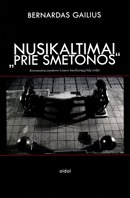In 1932, my uncle strangled his lover and put her body into a drainage well, intending to dissolve it later with acid from a laboratory where he and others were hoping to make a bomb to assassinate the Lithuanian strongman president, Antanas Smetona.
These are the kinds of intersections one finds when looking into the history of a small country, where the personal and the public lie very close to one another. I might never have stumbled on the murder story if historian Bernardas Gailius had not been writing about the politics and crimes of the period.
Not to say that everyone has a skeleton quite like this in the closet.
My murderous uncle is balanced by the uncle I am named after, a man who saved at least three Jewish children during the Nazi period. And my mother was the director of a teacher’s college where one of her employees eventually became one of Lithuania’s most prominent postwar partisans, Adolfas Ramanauskas, Vanagas.
But enough of the counterbalancing “good” relatives. Let’s return to my uncle Pranas, whom I never met and who died suddenly in Chicago in 1950.
My late mother barely knew him either, but remembered him as a silver-tongued storyteller, the must-have at any party, a scholar who taught German. We know as well that he was a volunteer in the Lithuanian war of independence, and one of the soldiers who helped seize the city of Klaipeda from the French in 1923.
Curiously, he was found guilty of the crime of murder but received only three years in prison because of “extenuating circumstances”. One wonders what those might have been, but the archives where the answer lies are crumbling with mold and so we only have newspaper stories to go by.
My godmother, who is still alive and who met him a few times in the forties, says that he was being followed around the country by an unbalanced woman who took every opportunity to lay false charges against him with the police, or embarrass him before his employers. Apparently, he finally broke under the strain and killed her in a moment of enraged passion.
This is the Fatal Attraction version of the story, the tale of a man pushed beyond his limits, and this version has some credence because of the short sentence he received.
On the other hand, part of the sentence was also that he support the child he had with the murder victim, a boy named Pranas as well.
If the victim had a child with him, one can see why she might have become unbalanced – the father of her child refused to marry her and make her a respectable woman. In a conservative society, her status must have been low, and as a single mother, she must have had trouble making ends meet, so she may have been chasing after him for support.
Where does the truth lie in this case? I can’t know for sure, so I just keep digging around in the country, a kind of archeologist puzzling over the moral artifacts.
My uncle Pranas has nothing to do with my forthcoming novel, although he might have something to do with the one after that. His story is just another one that I have stumbled across in my research, and it’s another reason why I cannot leave history and the historical novel alone.
Some of the other cases in Gailius’s book are quite compelling true crime stories. There’s the one about the country’s postmaster, who kept forged postage stamps in a warehouse in order to sell the real ones for personal profit; the story of Stepas Rickus, who spent a summer drinking, thieving, and murdering, only to disappear without a trace; the story of the diplomatic mission to Moscow which financed its expenses by selling saccharine on the black market.
How does it feel to have a murderous relative? Not that great, but if I’m going to be serious about looking into history for my literary material, I have to accept the complexity of the stories I find. And since I’m a writer, I have no intention of keeping them secret, any more than I would keep secret anything anyone said to me.
